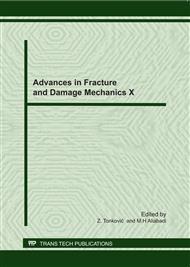p.218
p.222
p.226
p.230
p.234
p.238
p.242
p.246
p.250
Effect of Hydrogen on Mechanical Properties of Type 310S Stainless Steel
Abstract:
It is known that type 310S stainless steel is insensitive to hydrogen embrittlement. Then, the effect of hydrogen on the mechanical properties has not been studied in detail. In the present work, SSRT was carried out under hydrogen cathodic charging condition. Elongation increased by hydrogen charging, while reduction of area decreased. A lot of micro-cracks were observed on the side surface of fractured specimens into which hydrogen was charged, while no cracks were observed on the side surface of fractured specimens without hydrogen charging. Micro-cracks were also observed on the surface of unloaded specimens that were annealed after hydrogen charging. Therefore, it is considered that cracks occur from the defects induced by hydrogen charging.
Info:
Periodical:
Pages:
234-237
Citation:
Online since:
September 2011
Authors:
Keywords:
Price:
Сopyright:
© 2012 Trans Tech Publications Ltd. All Rights Reserved
Share:
Citation:


